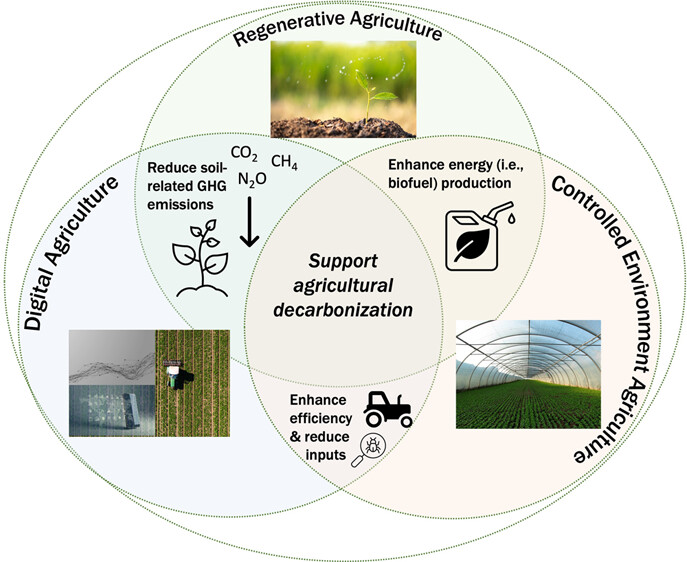Decarbonization of Agriculture: The greenhouse gas impacts and economics of existing and emerging climate-smart practices
November 03, 2023 | ACS Engineering Au |
Introduction: A research team from Pacific Northwest Laboratory in the US explores regenerative agriculture (RA), digital agriculture (DA), and controlled environment agriculture (CEA) as climate-smart farming approaches, assessing their potential to mitigate CO2, CH4, and N2O emissions while considering economic viability and research needs.
Key findings: While all three approaches show promise in CO2 mitigation, research on RA and DA is more extensive, particularly regarding non-CO2 emissions (N2O and CH4). However, methodological and data limitations persist, especially in assessing the CH4 footprint of RA practices. Uncertainties remain regarding the overall efficacy and persistence of mitigation, including soil carbon sequestration and lifecycle emissions of CEA compared to traditional systems. Economic feasibility varies across practices, with RA generally being more accessible. Integrating multiple approaches may offer synergistic benefits, addressing trade-offs between practices. Incentives, investments, and policy changes are crucial for enhancing farmer adoption. Further research is needed to better understand the per-kilogram emission reductions and yield impacts of these practices, aiding in meeting global food needs and GHG reduction goals.
Graphical Abstract

Viewed Articles
November 03, 2023 | ACS Engineering Au | Introduction: A research team from Pacific Northwest Laboratory in the US explores regenerative agriculture (RA), digital agriculture (DA), and controlled envi
Read More
June 23, 2022 | Science |  Introduction: Without rapid changes to agriculture and food systems, the goals of the 2015 Paris Agreement will not be met. In this review, researchers led by the University
October, 2023 | Agricultural Systems | Source |  Introduction: Ireland’s beef sector, responsible for 37% of national greenhouse gas (GHG) emissions, presents key opportunities for climate mitigation
June 20, 2021 | Journal of Cleaner Production | Source |¬†Introduction: Researchers from the University of Michigan (USA) analyzed the lifecycle GHG emissions of perishable foods‚ÄĒvegetables, fruits, me
September 26, 2023 | Nature Reviews Earth & Environment | Source | Introduction: This collaborative review, conducted by researchers from 3 universities in China, University of Exeter (UK), UC Davis,
April 29, 2021 | Environmental Research Letters | Source |  Introduction: Researchers from the University of Freiburg and University of Kassel (Germany), together with the Vienna University of Economi






